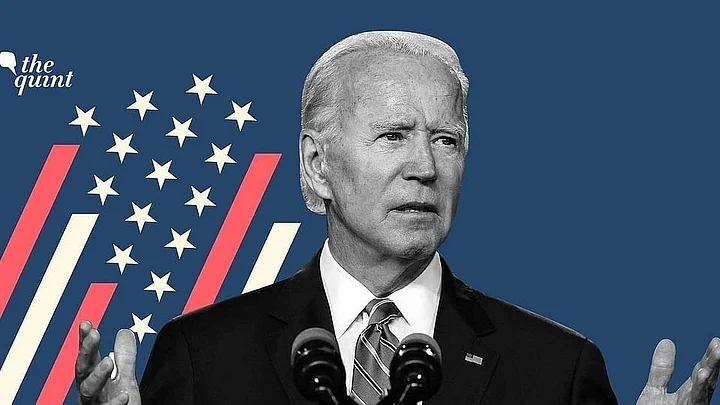Despite US President Joe Biden’s affinity for the “rule-based international order” established after World War II, his foreign policy is hastening its demise. In fact, there’s an ever-widening gulf between his administration’s homilies on internationalism and its approach to defending it.
Consider the evidence.
Last October, the Biden administration announced a raft of export controls designed to curtail Chinese companies’ access to advanced microchip technology.
It was an historic overreach, and marks an expansive use of export controls ostensibly for national security reasons. Even as the Biden administration has gone to great lengths to dispel the notion that a new Cold War is upon us, its actions are reminiscent of the Soviet-US rivalry.
Since the end of the Cold War, economic sanctions have been based mostly on trade disputes, human rights, or amid substantial global consensus that a state’s actions have imperiled the international order. China has trampled this notion, and now the US is following its lead.
China often weaponizes trade to punish countries that anger it. In 2010, China suspended salmon imports from Norway after a Chinese dissident won the Nobel Peace Prize.
Beijing has also subjected South Korea and Australia to similar treatment, and recently unleashed a torrent of economic sanctions on Lithuania after Vilnius opened a Taiwan Representative Office.
It’s hardly a model worthy of emulation for countries invested in using trade as a catalyst for peace, prosperity, and greater understanding.
America’s toxic and polarized politics, a feature of its particular brand of democracy – as well as a by-product of the inbuilt flaws of liberal democracy – have caused a chasm between what its politicians say about international cooperation and what they do.
A classic example of this is the Biden administration’s signature industrial policy initiative – the somewhat misnamed Inflation Reduction Act (IRA) – which earmarks billions of dollars in subsidies and tax credits to incentivize renewable energy companies and electric vehicle manufacturers to “re-shore” to the US.
The IRA now threatens to cause substantial de-industrialization in Europe, imperiling the EU’s post-COVID economic recovery.
The economic dislocation will also lead to the rise of populist forces in European politics that could complicate European unity at a time when Washington needs it most.
While French President Emmanuel Macron has called for a European response to the IRA, the fear among economically weaker European Union members is that only wealthier states like Germany and the Netherlands will be able to match American subsidies, further weakening internal EU cohesion.
Emerging powers like Saudi Arabia, India, Indonesia, and Brazil will have drawn the right conclusions from the contradictions inherent in Biden’s foreign policy.
It’s no surprise, then, that almost every country, including those that are in a military alliance with the US (Turkey), pursuing closer strategic ties with the US (India), or look to America as a net guarantor of security (Saudi Arabia), are pursuing their own economic and foreign policy self-interests.
For example, Indonesia’s economic nationalism vis-à-vis its nickel exports would have been extraordinary under a global order that truly adhered to free markets. Yet, given how America has barely moved in offering even friendly countries greater access to its domestic market, Indonesia’s actions are understandable.
Mostly for domestic reasons, and partly due to the need to distance himself from his predecessor, Biden has made democracy versus autocracy the organizing principle of his foreign policy. But not only is this an oversimplification, the president’s actions have rendered his words hollow.
In response to rising global energy costs, the Biden administration has quietly allowed American energy majors to re-enter Venezuela – even as the Maduro regime has done the bare minimum to democratize Venezuela’s politics.
In 2021, when the Biden administration hosted a “Summit for Democracy,” it didn’t invite Bangladesh, a raucous (albeit flawed) democracy of 165 million people that is also one of the world’s largest Muslim countries. Washington then imposed sanctions on Bangladesh’s paramilitary force for alleged human rights violations.
Yet, the administration seems to have a tamer approach to the new Netanyahu administration in Israel, whose policy plans threaten to take a sledgehammer to Israeli democracy, further violate the human rights of Palestinians, and imperil Palestinian statehood.
Within the US, a politicized Supreme Court that pronounces judgments in alignment with right-wing extremist ideology (the overturning of a 40-year precedent on abortion rights last year for example) will make it difficult for the US to lecture other countries on human rights.
Perceptions of American perfidy will not only weaken the prevailing global consensus over the international order but will reawaken past and extend misgivings about American neo-colonialism masquerading under the guise of a liberal democratic discourse. This is particularly true for the post-colonial Global South.
The consequences of this are already before us: Greater pursuit of plurilateral security and trade agreements between countries regardless of their political systems; increased economic nationalism under which free trade suffers; less focused global action over international crises like climate change; an overall deterioration in human rights around the world; and increasingly militarized solutions to interstate conflicts.
The Biden administration can say what it wants about upholding the global international order, but it can’t have it both ways
Dnyanesh Kamat is a political analyst who focuses on the Middle East and South Asia. He also consults on socio-economic development for government and private-sector entities.
(This is an opinion piece and the views expressed above are the author’s own. The Quint neither endorses nor is responsible for the same. This article was published in an arrangement with Syndication Bureau.)
